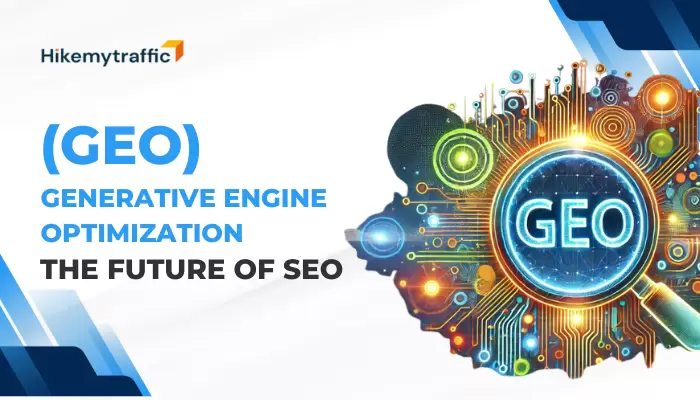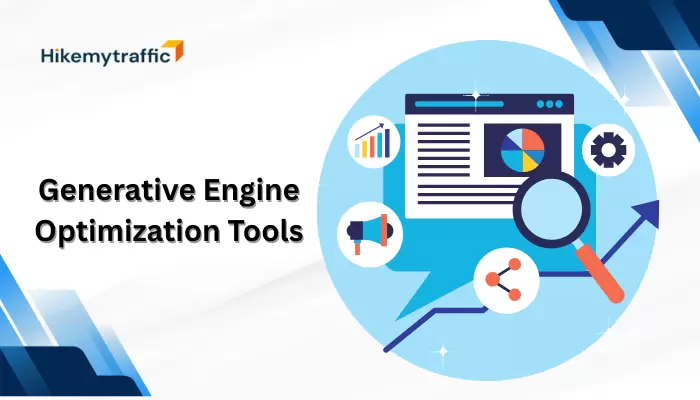Generative Engine Optimization (GEO)- The Future of SEO
Search Engine Optimization (SEO) is undergoing a revolutionary transformation. The emergence of artificial intelligence (AI) and machine learning has paved the way for a new concept: Generative Engine Optimization (GEO). This next-generation approach focuses on optimizing content for generative engines rather than just search engines, offering businesses a powerful way to enhance their online visibility and engagement.
In this guide, we will explore the fundamentals of Generative Engine Optimization, including its benefits, strategies, and tools. We will also delve into geo generative engine optimization and the best generative engine optimization tools available for businesses.
Whether you are an SEO expert or a business owner looking for the best SEO service, this article will provide valuable insights to help you navigate the future of digital marketing.
What is Generative Engine Optimization (GEO)?
Generative Engine Optimization (GEO) is an emerging digital marketing strategy that focuses on optimizing content for AI-powered generative search engines, such as Google's Search Generative Experience (SGE) and ChatGPT-based search tools.Understanding the Shift from SEO to GEOTraditional SEO focuses on optimizing content for search engines like Google, Bing, and Yahoo. It involves keyword optimization, backlinks, and technical improvements to rank higher in search engine results. However, the rise of AI-driven content creation and generative engines (like ChatGPT, Google Bard, and Claude) is changing how users access information.
Generative Engine Optimization (GEO) refers to the process of optimizing content for AI-driven generative engines. These engines analyze vast amounts of data and generate responses to user queries rather than just ranking web pages. Businesses that adapt to GEO can improve their content visibility in AI-generated responses, ensuring that their brand is recommended by AI-driven tools.
Why is GEO Important?
- Changing Search Behavior- More users are relying on AI-driven assistants for information rather than traditional search engines.
- Increased Engagement- AI-driven content recommendations provide personalized and interactive experiences.
- Higher Visibility- Optimizing for generative engines ensures your brand remains relevant in AI-generated answers.
- Competitive Advantage- Early adopters of GEO can outperform competitors who rely solely on traditional SEO strategies.
How Does Generative Engine Optimization Work?
GEO involves several key strategies to ensure content is optimized for generative engines:1. Content Optimization for AI Algorithms
- Focus on high-quality, informative, and engaging content.
- Use structured data to help AI understand your content better.
- Optimize for conversational and question-based queries.
2. Natural Language Processing (NLP) and Semantic SEO
- Utilize Natural Language Processing (NLP) to create content that AI engines can easily interpret.
- Implement semantic SEO by focusing on topic clusters instead of just keywords.
- Answer user intent clearly and comprehensively to align with AI-generated responses.
3. Enhancing Content Discoverability
- Ensure AI chatbots and generative engines can easily access your content.
- Use API integrations to feed AI engines with relevant content.
- Implement schema markup for better content structuring.
4. Building Trust and Authority
- Improve domain authority by acquiring high-quality backlinks.
- Establish credibility through expert content and authoritative sources.
- Encourage user engagement through interactive and AI-friendly content formats.
Geo Generative Engine Optimization (GEO GEO)
GEO (Geo Generative Engine Optimization) is a specialized approach to Generative Engine Optimization (GEO) that focuses on optimizing AI-generated content for local and geographic-specific searches.What is Geo Generative Engine Optimization?
Geo Generative Engine Optimization is a specialized subset of GEO that focuses on local search and location-based AI recommendations. This is crucial for businesses targeting specific geographic regions, such as local service providers, restaurants, and retail stores.Benefits of Geo Generative Engine Optimization
- Enhanced Local Visibility- AI-driven tools can recommend businesses based on location.
- Higher Local Search Ranking- Optimizing for location-based AI queries improves local search results.
- Improved Customer Experience- AI engines provide personalized local recommendations.
- Increased Foot Traffic- Businesses benefit from AI-generated location-based suggestions.
Strategies for Geo Generative Engine Optimization
- Optimize Google My Business (GMB)- Ensure your business is updated and verified.
- Use Local Keywords- Include location-based terms in your content.
- Encourage Local Reviews- AI engines consider customer reviews for recommendations.
- Implement Structured Data- Use schema markup for local business details.
- Create Hyper-Local Content- Focus on locally relevant blog posts, events, and news.
Generative Engine Optimization Tools
To effectively implement Generative Engine Optimization, businesses need the right tools. Here are some of the best generative engine optimization tools available today:
1. Google Bard & ChatGPT
AI-driven content generation and optimization.Helps understand AI-generated search trends.2. SurferSEO
Provides on-page SEO recommendations based on AI analysis.Helps in optimizing content for AI-driven engines.3. Clearscope
Uses NLP to optimize content for AI recommendations.Suggests relevant keywords and topics for GEO strategies.4. MarketMuse
AI-powered content strategy and optimization tool.Analyzes content gaps and suggests improvements.5. Yoast SEO
Assists in traditional SEO while incorporating AI-friendly optimizations.Helps with structured data implementation.6. Google Search Console & Bing Webmaster Tools
Provides insights into AI-driven search trends.Helps monitor AI-generated search traffic.SEO Service & GEO: The Future of Digital Marketing
The Role of SEO Services in GEO
SEO service providers must adapt to Generative Engine Optimization to stay relevant in the evolving digital landscape. Modern SEO services should include:AI-driven content strategies.- Optimizing for voice and conversational AI search.
- Implementing structured data for better AI visibility.
- Enhancing brand authority through AI-optimized content.
How Businesses Can Benefit from GEO-Optimized SEO Services
- Increased Brand Awareness- AI-driven engines recognize and recommend your content.
- Better Engagement- Optimized content leads to higher user interaction.
- Higher Conversions- AI-generated recommendations drive more relevant traffic.
- Future-Proof Strategy- Ensures long-term digital marketing success.
Conclusion
Generative Engine Optimization (GEO) is reshaping the way businesses approach online visibility. As AI-driven search tools become more prevalent, optimizing for generative engines rather than just traditional search engines is crucial for staying ahead in the digital space.By implementing geo-generative engine optimization strategies, businesses can improve local search visibility. Utilizing the right generative engine optimization tools ensures effective content optimization. Lastly, working with an advanced SEO service provider that understands GEO will help businesses achieve long-term success in the evolving world of AI-driven search.
Are you ready to optimize your content for the future? Start implementing GEO today and stay ahead of the competition!
FAQs
Here are some of the most frequently asked questions-
Generative Engine Optimization (GEO) is an emerging digital marketing strategy designed to optimize content for AI-powered generative search engines like Google’s Search Generative Experience (SGE) and ChatGPT-based search tools. Unlike traditional SEO, which focuses on ranking web pages, GEO focuses on ensuring content is surfaced and recommended by AI engines that generate responses based on user queries.
Traditional SEO is centered around optimizing content for search engines like Google, Bing, and Yahoo, typically focusing on keyword optimization, backlinks, and technical improvements to rank higher in search results. GEO, on the other hand, is about optimizing content so that it’s easily accessible and visible in AI-generated answers. With GEO, businesses target AI systems that analyze large amounts of data and generate responses instead of merely ranking pages.
As more users turn to AI-driven assistants for their information, businesses need to adapt to this shift. GEO is essential because it enhances visibility in AI-generated responses, offering businesses higher engagement and greater chances of being included in personalized AI recommendations. Moreover, adopting GEO gives companies a competitive edge as AI continues to change how search engines work.
The primary strategies for Generative Engine Optimization include creating high-quality, informative, and engaging content that AI algorithms can easily interpret. This involves using structured data and semantic SEO to organize content into topic clusters instead of focusing solely on keywords. Content must also address user intent clearly, optimizing for conversational queries and natural language. Additionally, ensuring that AI engines can access the content easily through proper schema markup and API integrations is key.
Geo Generative Engine Optimization (GEO GEO) is a specialized subset of GEO that focuses on optimizing AI-generated content for location-based searches. This strategy is crucial for businesses targeting local customers, such as restaurants, retail stores, and service providers. GEO ensures that businesses are visible in AI-generated responses tailored to specific geographic locations.
AI search engines analyze vast amounts of data and generate responses rather than just ranking pages. Businesses need to ensure their content is AI-friendly by using structured data, conversational content, and authoritative sources.
Businesses can transition by integrating AI-driven content strategies, optimizing for voice and conversational search, using structured data, and working with SEO services that specialize in GEO.
Let’s Design Your New Website
Do you want to have a website that stands out and impresses your clients? Then we are ready to help! Click the button below to contact us and discuss your ideas.


-1749106539.png)




Goutam Singh
Hi, I Am Goutam Singh, Content Writer At HikeMyTraffic.com And Founder Of BizAdda360. SEO Expert And Web Developer By Passion.